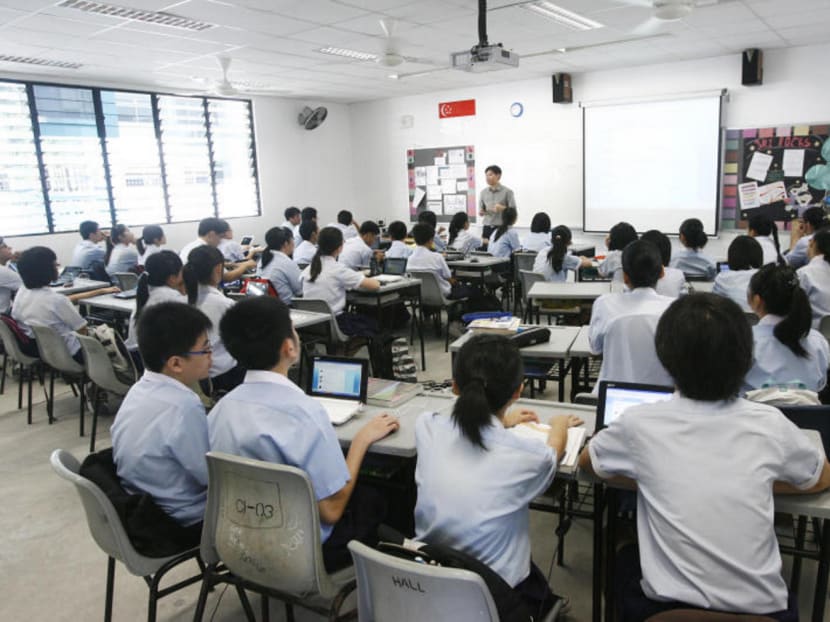DSA revisions laudable, but challenge lies in transparency
Earlier this month, Minister of Education (Schools) Ng Chee Meng announced changes to the Direct School Admissions (DSA) scheme.
Earlier this month, Minister of Education (Schools) Ng Chee Meng announced changes to the Direct School Admissions (DSA) scheme.
Starting next year, all secondary schools will be able to admit a higher proportion (up to 20 per cent) of their secondary one intake through the DSA.
Schools will also discontinue the use of general ability tests in the selection of students entering through this scheme.
These changes are positive because they reinforce the importance of having a well-balanced and holistic education, and are consistent with the message of shifting away from a system that narrowly emphasises academic achievement.
With these moves, admission to secondary schools via DSA will no longer be based purely on academic results but also on whether students can demonstrate their talents and strengths in other areas, if they wish.
This provides students with recognition beyond academic achievement and rewards them for capabilities and strengths in non-academic areas such as sports, drama or music.
With schools now developing capabilities in niche programmes, the expansion of the DSA scheme presents an opportunity for students to better access schools with capabilities in their interest areas and so have their talents nurtured.
The move away from general academic ability tests also means that entry through DSA will now be determined by the student’s talents and qualities, rather than cognitive ability.
The hope is that this will introduce more diversity, especially in the popular schools, which have traditionally selected students based on grades.
Indeed, parents and various Members of Parliament have expressed concern that the DSA benefits children who have more resources.
While 81 per cent of Singapore residents live in Housing and Development Board flats, only about 60 per cent of students who have secured places in secondary schools through the DSA live in HDB dwellings.
Should we be worried about this? Not really. It is true that those with more resources would have greater ability to prepare their children for selection into desired schools through the DSA, since they would be better able to afford enrichment classes designed to help prepare students for the DSA interviews and tests.
But it would be unrealistic to think that the profile of students entering schools through DSAs would be anything like the profile of the typical Singapore student. There are two reasons for this.
First, there is often a high degree of correlation between student wealth and non-academic talent. Why? Consider students who excel in music. Affluent parents would be in a better position to provide their kids with music lessons at a young age to hone their musical talents.
Second, parents who are well informed about the DSA scheme and who opt to exercise this option are also likely to be better educated and therefore more affluent.
These two reasons imply that it should come as no surprise that children who enter through the DSA are also the ones who are better off financially.
The changes mean that DSA selection will now depend on whether students can demonstrate the strengths and qualities desired by the school.
In light of this, it is now more important for schools to communicate their selection criteria transparently.
For example, clear communication can be made regarding the qualities that candidates should possess, and the list of documents and evidence required to assess the suitability of candidates.
While non-cognitive skills like tenacity, resilience, trustworthiness and perseverance are important traits desired by schools, schools should be mindful that these are typically difficult to measure and will be measured subjectively, depending on the person evaluating the child.
So any evaluation of these traits should ideally be complemented by more objective measures (answering questions such as “Has the student ever represented his/her school at the national/school level?”, “Has the student ever held a leadership position at the community/school/class level?” and so forth).
It would be useful for schools to develop a set of metrics that can reliably measure the desired achievements and attributes possessed by each applicant.
The changes to the DSA scheme are laudable.
The challenge now for schools is to implement them in a way that is regarded as fair and transparent.
ABOUT THE AUTHOR:
Kelvin Seah Kah Cheng is a lecturer in the department of economics, National University of Singapore. His research focuses on the economics of education.










